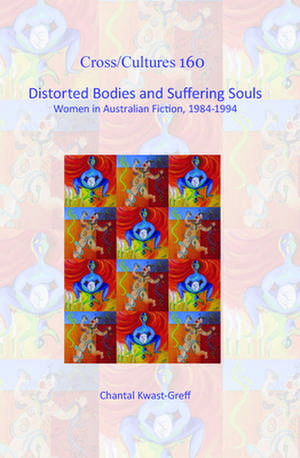Distorted Bodies and Suffering Souls: Women in Australian Fiction, 1984-1994: Cross/Cultures, cartea 160
Autor Chantal Kwast-Greffen Limba Engleză Hardback – 31 dec 2012
Din seria Cross/Cultures
-
 Preț: 387.83 lei
Preț: 387.83 lei - 18%
 Preț: 842.69 lei
Preț: 842.69 lei -
 Preț: 325.74 lei
Preț: 325.74 lei - 18%
 Preț: 530.05 lei
Preț: 530.05 lei - 18%
 Preț: 620.52 lei
Preț: 620.52 lei - 18%
 Preț: 923.06 lei
Preț: 923.06 lei - 18%
 Preț: 912.78 lei
Preț: 912.78 lei - 18%
 Preț: 676.05 lei
Preț: 676.05 lei - 15%
 Preț: 491.73 lei
Preț: 491.73 lei - 18%
 Preț: 529.87 lei
Preț: 529.87 lei - 18%
 Preț: 695.21 lei
Preț: 695.21 lei - 15%
 Preț: 465.45 lei
Preț: 465.45 lei - 15%
 Preț: 529.11 lei
Preț: 529.11 lei - 15%
 Preț: 456.13 lei
Preț: 456.13 lei -
 Preț: 368.50 lei
Preț: 368.50 lei -
 Preț: 306.75 lei
Preț: 306.75 lei - 15%
 Preț: 456.33 lei
Preț: 456.33 lei - 18%
 Preț: 536.06 lei
Preț: 536.06 lei - 18%
 Preț: 885.52 lei
Preț: 885.52 lei -
 Preț: 402.01 lei
Preț: 402.01 lei -
 Preț: 401.92 lei
Preț: 401.92 lei - 15%
 Preț: 408.72 lei
Preț: 408.72 lei - 18%
 Preț: 711.48 lei
Preț: 711.48 lei - 28%
 Preț: 573.59 lei
Preț: 573.59 lei - 18%
 Preț: 698.59 lei
Preț: 698.59 lei - 18%
 Preț: 572.67 lei
Preț: 572.67 lei - 18%
 Preț: 788.35 lei
Preț: 788.35 lei - 18%
 Preț: 1095.77 lei
Preț: 1095.77 lei - 18%
 Preț: 766.64 lei
Preț: 766.64 lei - 18%
 Preț: 536.51 lei
Preț: 536.51 lei - 18%
 Preț: 514.12 lei
Preț: 514.12 lei - 18%
 Preț: 576.05 lei
Preț: 576.05 lei - 18%
 Preț: 576.05 lei
Preț: 576.05 lei - 18%
 Preț: 670.77 lei
Preț: 670.77 lei - 18%
 Preț: 727.82 lei
Preț: 727.82 lei - 18%
 Preț: 700.80 lei
Preț: 700.80 lei - 18%
 Preț: 724.05 lei
Preț: 724.05 lei - 18%
 Preț: 760.38 lei
Preț: 760.38 lei - 18%
 Preț: 604.39 lei
Preț: 604.39 lei - 18%
 Preț: 759.36 lei
Preț: 759.36 lei -
 Preț: 308.26 lei
Preț: 308.26 lei - 18%
 Preț: 608.03 lei
Preț: 608.03 lei - 18%
 Preț: 701.60 lei
Preț: 701.60 lei -
 Preț: 307.77 lei
Preț: 307.77 lei - 18%
 Preț: 639.51 lei
Preț: 639.51 lei - 18%
 Preț: 606.50 lei
Preț: 606.50 lei - 18%
 Preț: 536.26 lei
Preț: 536.26 lei
Preț: 545.21 lei
Preț vechi: 664.89 lei
-18% Nou
Puncte Express: 818
Preț estimativ în valută:
104.33€ • 109.15$ • 86.66£
104.33€ • 109.15$ • 86.66£
Carte indisponibilă temporar
Doresc să fiu notificat când acest titlu va fi disponibil:
Se trimite...
Preluare comenzi: 021 569.72.76
Specificații
ISBN-13: 9789042036628
ISBN-10: 9042036621
Pagini: 325
Dimensiuni: 155 x 235 x 22 mm
Greutate: 0.7 kg
Editura: Brill
Colecția Brill
Seria Cross/Cultures
ISBN-10: 9042036621
Pagini: 325
Dimensiuni: 155 x 235 x 22 mm
Greutate: 0.7 kg
Editura: Brill
Colecția Brill
Seria Cross/Cultures
Cuprins
Acknowledgements
Introduction
“Women are Not Maniacs by Nature”. Of Patriarchy, Colonization, and the Church. A Complex Web of Systematic Oppression. Beauty and the Beast
Fathers and Husbands. Of Power and Contempt. Big Bad Wolves and Sex. Virgins. Baddies and Daddies. Mothers. Daughters. Incest
Victims: The Other and the Self. A Conclusion of Sorts. Women, Victims of Themselves
Suffering Souls and Distorted Bodies. Of Dolls, Puppets, and Masters and Slaves. Dream-Paradise. Private Ceremonies and Rituals. Saints, Angels and Food. Wrist-Cutters and Others. Wounds and Blood and Baby-Killers
Unacceptable Behaviours and Their Cures. Unacceptable Behaviours – Says Who? Cures: The Good Fuck and Pull Up Your Socks. Doctors and Hospital. And Patriarchy
Women Write About Women. About Writing Madness. Text and Manipulations. Langage and Voice, Frames and Boxes. The Mirror and the Text. Écriture féminine
A Risky Business. Of Puppets and Puppet-Masters. Writers with a Mission
Writing. Mad Women in Australia Today
Conclusion. Women Who Fight Win. Eventually. It is Good to Be a Woman
Works Cited
Index
Introduction
“Women are Not Maniacs by Nature”. Of Patriarchy, Colonization, and the Church. A Complex Web of Systematic Oppression. Beauty and the Beast
Fathers and Husbands. Of Power and Contempt. Big Bad Wolves and Sex. Virgins. Baddies and Daddies. Mothers. Daughters. Incest
Victims: The Other and the Self. A Conclusion of Sorts. Women, Victims of Themselves
Suffering Souls and Distorted Bodies. Of Dolls, Puppets, and Masters and Slaves. Dream-Paradise. Private Ceremonies and Rituals. Saints, Angels and Food. Wrist-Cutters and Others. Wounds and Blood and Baby-Killers
Unacceptable Behaviours and Their Cures. Unacceptable Behaviours – Says Who? Cures: The Good Fuck and Pull Up Your Socks. Doctors and Hospital. And Patriarchy
Women Write About Women. About Writing Madness. Text and Manipulations. Langage and Voice, Frames and Boxes. The Mirror and the Text. Écriture féminine
A Risky Business. Of Puppets and Puppet-Masters. Writers with a Mission
Writing. Mad Women in Australia Today
Conclusion. Women Who Fight Win. Eventually. It is Good to Be a Woman
Works Cited
Index
Notă biografică
Chantal Kwast-Greff, born in 1953 across French and German cultures, read English at the University of Strasbourg and did a postgraduate course on South African and Australian literatures at Montpellier and Cape Town Universities. She holds a PhD from the University of Toulouse (France) and James Cook University (Australia) and currently teaches Australian literature at the University of New Caledonia, where she is a member of the CNEP–UNC (Centre des nouvelles études sur le pacifique). Her research focuses on postcolonial and women’s writing. She is an Australian Resident.
